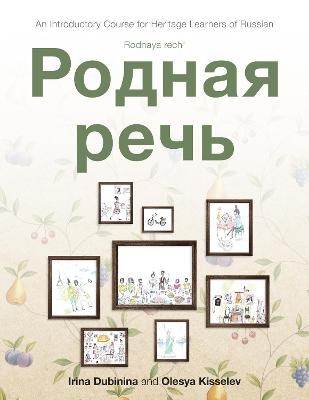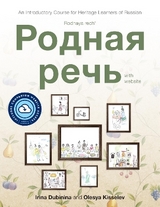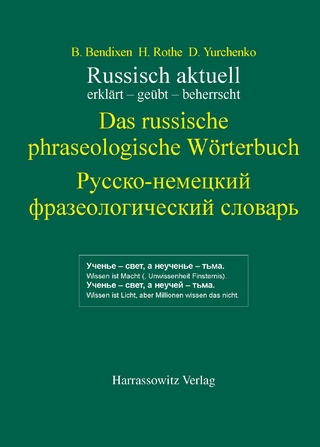
Rodnaya rech'
Georgetown University Press (Verlag)
978-1-62616-639-4 (ISBN)
- Titel erscheint in neuer Auflage
- Artikel merken
E-Textbooks are now available to purchase or rent through VitalSource.com! Please visit VitalSource for more information on pricing and availability.
As of January 1, 2021, Smart Sparrow Companion Websites are no longer available for any of our textbook programs. New companion websites are coming soon, and will be hosted by Lingco. When it becomes available, instructors may sample the new companion websites by visiting GUPTextbooks.com/companionwebsites. The full websites will be available for fall 2021 course adoption.
Until the new companion websites become available, eBook Workbooks with exercises from the Smart Sparrow Electronic Workbook are available for purchase on the GUP website and VitalSource.com, as are Workbook Answer Keys. They will both be sold in eBook format only.
Rodnaya rech', an introductory textbook for heritage learners, addresses the unique needs of students who have at least intermediate-level listening and speaking skills on the ACTFL scale but who have underdeveloped or nonexistent literacy skills. With an emphasis on conceptual understanding of vocabulary and grammar, Rodnaya rech' builds students' literacy skills and teaches them to strategically use the linguistic intuition they have gained as heritage speakers while strengthening all four skill areas.
Essential to learning with Rodnaya rech’ is the workbook, which includes all of the homework activities and texts for reading comprehension (sold separately). These practice activities allow students to practice what they are learning in the textbook.
With this textbook designed for in-class work and the accompanying workbook, Rodnaya rech' can be used as the main course material either in an intensive one-semester class or at a more measured pace over two semesters. This book is flexible enough to be used in specialized heritage or in mixed classes. It can also support independent study and learning in less formal settings, such as community schools.
For Teachers:
Exam copies of the textbook are available free of charge to instructors and can be ordered on this page. To request a print sample, please use the "print" exam copy button. To request a digital sample, instructors should log onto VitalSource.com, select "Faculty Sampling" in the upper right-hand corner, and select the desired products.
Irina Y. Dubinina is associate professor of Russian at Brandeis University, where she also directs the Russian language program. She has extensive experience teaching Russian as a second and heritage language. Olesya Kisselev is an assistant professor in the Department of Bicultural-Bilingual Studies at University of Texas at San Antonio. She has many years of experience teaching Russian as a second and heritage language.
Table of Contents
Chapter 0: Вводная (Introduction)PhoneticsMorphologyGrammar: parts of speech
Chapter 1: Как описать внешность и характер человека (How to describe people)В центре внимания: значение словаВ центре внимания: форма словаo Части речи: прилагательные и наречия (Parts of speech: adjectives and adverbs)o Окончания прилагательных (Adjectival endings)o Нюансы окончаний прилагательных (Nuances of adjectival endings)o Превосходная степень прилагательных (Superlative degree of adjectives)Подводим итоги
Chapter 2: Как говорить о распорядке дня (How to talk about daily routine)В центре внимания: значение словаВ центре внимания: форма словаГлаголы (Verbs)o Начальная форма глагола (Infinitive)o Возвратные глаголы (Reflexive verbs)o Правописание глаголов с –СЯ (Spelling of the particle -СЯ in reflexive verbs)Время глагола (Tense)o Прошедшее время (Past tense)o Настоящее и будущее время (Present tense and future tense)o Окончания спрягаемой формы глагола (Endings of conjugated verbs)o Чередование согласных (Consonant mutation)Проблемные глаголы (Tricky verbs)o Глаголы с суффиксом – ОВА- (Verbs with the –OBA- suffix)o Глаголы УЗНАВАТЬ, ВСТАВАТЬ и ДАВАТЬ (Verbs of the type ДАВАТЬ)Подводим итоги
Chapter 3: Как говорить о том, что было, что есть и что будет (How to describe past and future events)В центре внимания: значение словаВ центре внимания: форма словаВид глагола (Verbal aspect)o Формы глаголов несовершенного и совершенного вида (Imperfective/perfective forms of verbs)Функции (использование) видов глагола (Functions of verbal aspect)Вид глагола и время (Verbal aspect and tense)o Вид глагола и наречия (Verbal aspect and adverbs)Сложные видовые формы (Tricky aspectual pairs)Подводим итоги Применяем знания на практике
Chapter 4: Как говорить о семье и друзьях (How to talk about family and friends)В центре внимания: значение словаВ центре внимания: форма словаКонцепция падежа (Grammatical case)Родительный падеж (Genitive case)o Важные нюансы (Important nuances)Прилагательные и притяжательные местоимения в родительном падеже (Adjectives and possessive pronouns in the genitive case)Личные местоимения (Personal pronouns)Функции родительного падежа (Functions of the genitive case)o Принадлежность: у кого что есть (Posession: expressing the idea of ‘having’)o Притяжательная функция: чей? (Expressing belonging: whose)o Описательная (аттрибутивная) функция родительного падеж (Attributive function)o Недостаток или отсутствие чего-либо (Insufficient amount of something, lack of something, or absence of something or somebody)Подводим итоги Применяем знания на практике
Chapter 5: Как говорить о мирe, который меня окружает (How to describe a community where I live)В центре внимания: значение словаВ центре внимания: форма словаСуществительные в родительном падеже множественного числа (Nouns in plural genitive case)Прилагательные в родительном падеже множественного числа (Adjectives in plural genitive)Важные детали в форме родительного падежа множественного числа (Important details)Разделительная гласная (Fill vowel)Исключения (Exceptions)Новая функция родительного падежа: счëт (Additional function of the genitive case: counting)Подводим итоги Применяем знания на практике
Chapter 6: Как говорить о учëбе (How to talk about university studies)В центре внимания: значение словаВ центре внимания: форма словаВинительный падеж существительных и прилагательных в единственном числе (Accusative of nouns and adjectives: singular)Функции винительного падежа (Functions of the accusative case)o Функция №1: прямое дополнение (Function 1: direct object)o Функция № 2: направление и направленность (Function 2: direction and directionality)o Функция №3: винительный падеж с предлогами (Function 3: accusative case with prepositions)Винительный падеж существительных и прилагательных во множественном числе (Accusative of nouns and adjectives: plural)Подводим итоги Применяем знания на практике
Chapter 7: Как говорить о поездках, переездах и путешествиях (How to talk about trips and travel)В центре внимания: значение словаГлаголы движения (Verbs of motion)Направленность (Directionality)o Средство перемещения: пешком или на транспорте (Conveyance: on foot vs. via transportation)o Глаголы движения с приставками (Prefixed verbs of motion)o Общее значение движения (Generalized meaning of verbs of motion)В центре внимания: форма словаСпряжение глаголов движения (Conjugation of Verbs of Motion)Направление и направленность (Direction and directionality)Повторение окончаний в винительном падеже единственного числа (Review of accusative singular)Глаголы позиционирования, самопозиционирования и положения (Verbs of positioning, self-positioning and location)Повторение окончаний в винительном падеже множественного числа (Review of accusative plural)Подводим итоги Применяем знания на практике
Chapter 8: Как говорить о чувствах и эмоциях, радостных и грустных событиях (How to talk about feelings and emotions)В центре внимания: значение словаВ центре внимания: форма словаДательный падежo Формулируем гипотезуПрилагательные и притяжательные местоимения единственного числа в дательном падежеЛичные местоимения в дательном падежеОписание эмоциональных состоянийСуществительные, прилагательные и местоимения множественного числа в дательном падежеГлаголы, требующие дательный падежРазные окончания – разное значение – разные падежиПодводим итоги
Chapter 9: Как говорить о том, где мы живём (How to talk about where people live)В центре внимания: значение словаВ центре внимания: форма словаПредложный падежo Формулируем гипотезуРасширяем функции предложного падежаЛичные местоимения в предложном падежеПрилагательные и притяжательные местоимения в предложном падежеПодводим итоги Применяем знания на практике
Chapter 10: Как говорить о своих профессиональных и любительских интересах (How to talk about people’s interests)В центре внимания: значение словаВ центре внимания: форма словаТворительный падеж.o Формулируем гипотезуПрилагательные и притяжательные местоимения в творительном падежеЛичные местоимения в творительном падежеО глаголах в творительном падежеo Нюансы творительного падежа. Глагол to be.Подводим итоги Применяем знания на практике
Chapter 11: Подводим итоги (Review)Категория рода и числаКатегория падежаo Субъект и объектo Дополнение места: место нахождения, место направления и место отправленияo Пространственные предлогиo Категория времениo Временные предлогиКатегория времени и вида глаголаo Конкуренция видаГлагольное управлениеСочетаемостьНа прощание
Index
| Erscheinungsdatum | 17.08.2019 |
|---|---|
| Zusatzinfo | 2 Halftones, color; 44 Illustrations, black and white; 5 Illustrations, color |
| Verlagsort | Washington, DC |
| Sprache | russisch |
| Maße | 216 x 279 mm |
| Gewicht | 612 g |
| Themenwelt | Schulbuch / Wörterbuch ► Wörterbuch / Fremdsprachen |
| Geisteswissenschaften ► Sprach- / Literaturwissenschaft ► Slavistik | |
| Geisteswissenschaften ► Sprach- / Literaturwissenschaft ► Sprachwissenschaft | |
| ISBN-10 | 1-62616-639-0 / 1626166390 |
| ISBN-13 | 978-1-62616-639-4 / 9781626166394 |
| Zustand | Neuware |
| Informationen gemäß Produktsicherheitsverordnung (GPSR) | |
| Haben Sie eine Frage zum Produkt? |
aus dem Bereich



